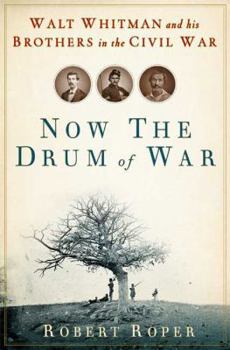Now the Drum of War: Walt Whitman and His Brothers in the Civil War
Select Format
Select Condition 
Book Overview
The Civil War is seen anew, and a great American family brought to life, in Robert Roper's brilliant evocation of the Family Whitman. Walt Whitman's work as a nurse to the wounded soldiers of the... This description may be from another edition of this product.
Format:Hardcover
Language:English
ISBN:0802715532
ISBN13:9780802715531
Release Date:October 2008
Publisher:Walker & Company
Length:421 Pages
Weight:1.75 lbs.
Dimensions:1.4" x 6.4" x 9.5"













